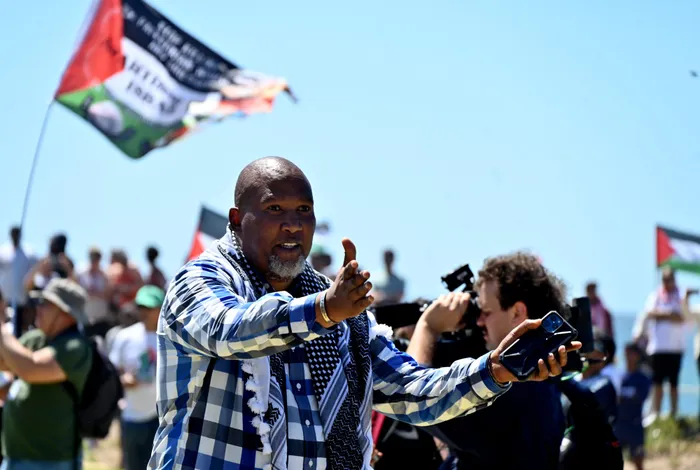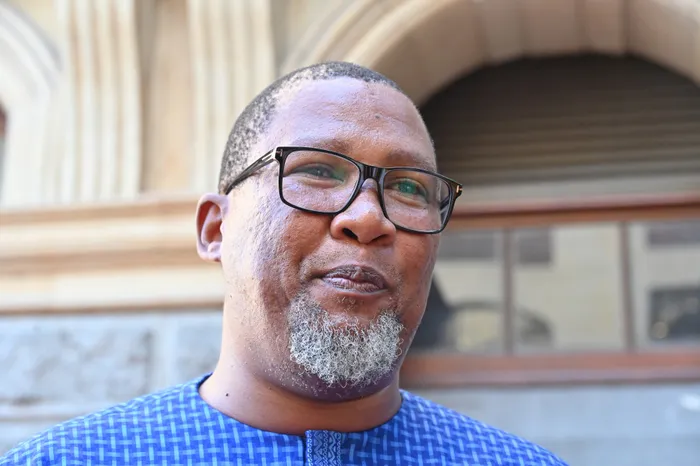
Mandla Mandela.
Image: Ayanda Ndamane/Independent Newspapers
ON a vessel en route to Gaza, the late Nelson Mandela’s grandson, Mandla, marked Heritage Day by following in his grandfather’s footsteps, travelling to the same place the former president visited in 1995.
During that 1995 visit, Mandela voiced solidarity with the Palestinian cause, saying “our freedom is incomplete without the freedom of the Palestinian people".
“This is where I celebrated Heritage Day this year,” Mandla said. “And the struggle for freedom is my heritage.”
Speaking from the Global Sumud Flotilla, Mandla told IOL it was an honour to carry the baton passed down by his grandfather.
The Global Sumud Flotilla is a coalition of civilian vessels seeking to break the Israeli blockade of Gaza and deliver humanitarian aid.
“My grandfather was never overwhelmed regardless of the enormity of the challenges we faced as a family and as a nation at the height of the apartheid era,” the 51-year-old said.
“Today, as we look back over three decades of democracy, it is easy to see the gargantuan challenges that we face.
"Heritage is about celebrating the journey covered, planning the road ahead and dreaming about what we leave for posterity. The struggle continues.”

Mandla Mandela said: "The struggle for freedom is my heritage."
Image: Ayanda Ndamane/independent Newspapers
Mandla said his understanding of heritage had deepened with time.
“We honour the villages that gave birth to us and shaped the values that have made us. It is these values that shaped the continuum of our heritage, that made us who we are and informed our daily struggles and lived experiences.”
As a traditional leader, he said he felt the weight and responsibility of preserving heritage.
“There were moments when we confronted the impact of colonisation on traditional life and the struggle to defend what is our birthright. That struggle carried into systems and power structures that largely displaced traditional governance.
"When we saw unequal development, especially in rural areas, it connected us to the pain and suffering of our people.
"Heritage was alive in the struggles we waged to shape the world we bequeathed to posterity.”
He also reflected on the dangers of forgetting history.
“Heritage is memory, and society selects the narratives it wants to tell. Many aspects of our African heritage have been erased or consigned to the dustbin of history. Few can speak of their history beyond a generation or two ... those who forget their history will be forgotten by history.”
Passing lessons to younger generations was vital, he said.
“Ours is primarily an oral tradition, with stories, indigenous knowledge, values and culture passed from generation to generation. Technology can help support this for our children and younger generations,” he said.
On the state of SA, Mandla said: “We celebrated our constitutional democracy and the gains of the past 31 years. The values and vision of my grandfather were enshrined in the Constitution, the Freedom Charter and our National Democratic Revolution. Yet there is much that remains to be addressed.
"We must eradicate poverty and inequality, create jobs, fight crime and corruption, and build a national consciousness that cares for the most vulnerable. That is the unfinished business of our democracy.”
Mandla said ordinary South Africans played a vital role in keeping heritage alive.
“As long as we held onto our values, there was hope. We owed it to posterity to preserve what had been handed down and pass it on,” he said.
His message to young South Africans was simple: “Never give up. SA is your heritage in all its glory and diversity. Own it and tell your own story,” he said.
Cape Times
Related Topics: